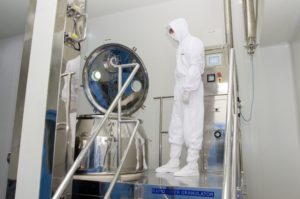About us
The pharmaceutical company "NIKA PHARM" LLC was established on July 5, 2006. The company is a manufacturer of pharmaceuticals. Since the beginning of its operation on the republican pharmaceutical market, "NIKA PHARM" has established itself as an enterprise for the production of high-quality products in demand designed to reach the general population.
Sergey Eduardovich Kim, CEO of OOO NIKA PHARM
The company aims to meet international quality standards. Hence, in September 2009, "NIKA PHARM" became the first manufacturing enterprise in the pharmaceutical industry of the Republic of Uzbekistan, certified by the German international company TUV Turinger according to the new version of the ISO 9001: 2008 standard. In August 2010, the company successfully passed an external audit of the supervisory committee (ISO 9001: 2008) and confirmed compliance with the international requirements of the QMS. In December 2018, the company confirmed its compliance with the new version of ISO 9001: 2015.
In 2012, the NIKA PHARM Company was one of the first to receive the GMP certificate of the national standard in the Republic of Uzbekistan, and in 2018 confirmed its compliance with the new version O'z Dst 2766: 2018 standard.
Quality. Efficiency. Safety.
 The production of medicines includes an incomplete production cycle of medicines (final stages: packaging, labeling, packaging of raw materials "in-bulk") and a full production cycle of medicines and dietary supplements - the production of tablets and capsules, sachet-bags from substances and excipients.
The production of medicines includes an incomplete production cycle of medicines (final stages: packaging, labeling, packaging of raw materials "in-bulk") and a full production cycle of medicines and dietary supplements - the production of tablets and capsules, sachet-bags from substances and excipients.
The production site of NIKA PHARM LLC consists of three workshops, two of which (workshops № 1, № 3) are certified according to the requirements of O'zDST 2766: 2018.
Workshop № 1: packing and packaging of solid drugs (tablets and capsules), sachet packaging, labeling, and packaging of nasal sprays.
Workshops № 2, № 3: production of solid dosage drugs and dietary supplements (tablets, capsules); powders (sachets) and liquid drugs (sprays).

- obtaining mass for tableting / encapsulating / sachet-packets
- preparation of a solution for sprays
- tableting / encapsulating / filling
- coating of tablets with a shell
- packing of tablets / capsules / granules
- packaging
Technological processes for the production of drugs (tablets, capsules, and sachet-packets) are carried out on equipment manufactured in India, the company "Chitra machineries pvt ltd." and Karnavati machines ltd. India.
The process equipment has passed the qualification procedure, which guarantees the compliance of the products with the requirements of the Regulatory Document. Finished products are constantly manufactured under the same controlled conditions, following the same established procedure as at the time of qualification.
Warehouses

The storage of substances, excipients, raw materials "in bulk" packaging materials and printed materials, finished products authorized for sale are carried out in warehouses. The requirements for ensuring the safety of products are observed. The warehouses are guarded by the Security Service; the storage conditions in the warehouses are monitored using thermionic hygrometers and maintained using a supply and exhaust ventilation and air conditioning system.
The warehouses of substances, excipients, raw materials "in bulk" packaging materials, and printed products are provided with zones for quarantine storage and main storage.
In the warehouse of finished products, there are zones for storing thermolabile products. The received goods are stored on racks and pallets and do not exceed a height of 1.5 meters. Products are identified using information sheets.
Laboratory research
Control and analytical testing laboratory of NIKA PHARM LLC is accredited for technical competence (accreditation certificate No. UZ.AMT.07.MAI. 754 dated 11.01.2010 for compliance with the requirements of the O'z DSt ISO / IEC 17025: 2007 standard), annually confirms compliance with the requirements of the O'z DSt ISO / IEC 17025: 2007 standard (order of the Accreditation Council No. IN-126 dated June 19, 2015).
The quality control department carries out:
- Incoming control of "in-bulk" raw materials, substances, and auxiliary materials. Analysis of raw materials is carried out according to a regulatory document, after which a test report is drawn up.
- Incoming control of the purchased laboratory equipment is carried out according to the specification to the contract/agreement, according to the passport (equipment operation manual), and the packing list with the registration of the protocol of the incoming control for the equipment.
- Incoming inspection of primary and secondary packaging material and printed products: PVC film, aluminum foil for compliance with the regulatory document and internal specifications.
- Controlling microbiological cleanliness of air and surfaces of industrial premises, washings of clothing, and hands of production personnel working in "clean" conditions.
- Monitoring the stability of archived samples.
- Sampling of raw materials and materials, intermediate and finished products, and carrying out physicochemical and microbiological analyzes for compliance with regulatory documents.
The documentation system of the quality control department consists of the documents required by the O'z DSt ISO / IEC 17025: 2007 standard and from internal documents developed at the request of the enterprise's integrated quality management system.
Kaizen system
The Japanese Kaizen system operates at the production facility of NIKA PHARM LLC.
The word "Kaizen" means change for improvement. The Kaizen philosophy is about continuous improvement. Moreover, all employees are involved in the ongoing improvement process, which allows us to improve and optimize it at all levels. Also, Kaizen practice has shown that without reducing the quality of products, it is possible to achieve results: increased productivity, shorter process times, lower costs, improved comfort of employees and the development of their creative skills, and increased staff efficiency.



